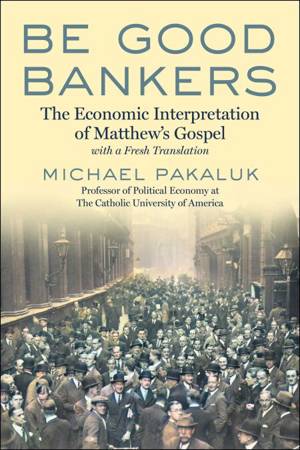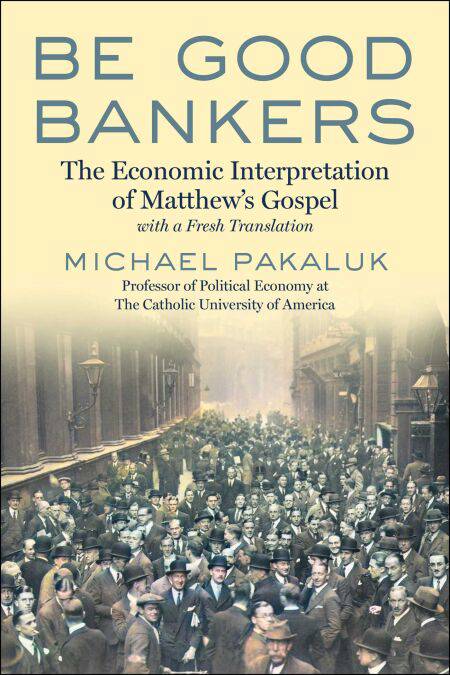
Bedankt voor het vertrouwen het afgelopen jaar! Om jou te bedanken bieden we GRATIS verzending (in België) aan op alles gedurende de hele maand januari.
- Afhalen na 1 uur in een winkel met voorraad
- In januari gratis thuislevering in België
- Ruim aanbod met 7 miljoen producten
Bedankt voor het vertrouwen het afgelopen jaar! Om jou te bedanken bieden we GRATIS verzending (in België) aan op alles gedurende de hele maand januari.
- Afhalen na 1 uur in een winkel met voorraad
- In januari gratis thuislevering in België
- Ruim aanbod met 7 miljoen producten
Zoeken
Be Good Bankers E-BOOK
The Economic Interpretation of Matthew's Gospel, with a Fresh Translation
Michael Pakaluk
E-book | Engels
€ 24,59
+ 24 punten
Omschrijving
Discover the inherent connections between commerce, the Christian faith, and the divine economy through this groundbreaking interpretation of Matthew’s Gospel.
Suppose that the author of the Gospel of Matthew was an ambitious tax collector who was intricately familiar with the best practices of Roman banking, accounting, and contract law. As a result, wouldn’t we expect to see a unique account of Jesus’s life, death, and resurrection that was suffused with business principles and economic rationality?
This, argues Michael Pakaluk, is exactly what we find in the Gospel according to Matthew.
In Be Good Bankers: The Economic Interpretation of Matthew’s Gospel, with a Fresh Translation, Pakaluk reconciles the tension often felt between business and economics on the one hand, and the Christian faith on the other, revealing how the gospel message is inherently infused with economic principles. Pakaluk illuminates the economic undertones in Matthew’s Gospel and reveals that our very nature is designed for business, a fact that God uses to teach us about himself.
Be Good Bankers delves into the idea that we are all bankers in the divine economy established by the Incarnation of Jesus—the ultimate exchange of divinity for human nature—and his Passion, Resurrection, and Ascension. Through exploring the use of debts, receipts, ledgers, deposits, withdrawals, payments, and exchanges in Matthew’s Gospel, Pakaluk provides a compelling framework for understanding how Christians can live and work with our own debts of justice, gratitude, and love.
This book is an essential guide for anyone seeking to navigate the intersection of faith and commerce and find their place in the divine economy.
Suppose that the author of the Gospel of Matthew was an ambitious tax collector who was intricately familiar with the best practices of Roman banking, accounting, and contract law. As a result, wouldn’t we expect to see a unique account of Jesus’s life, death, and resurrection that was suffused with business principles and economic rationality?
This, argues Michael Pakaluk, is exactly what we find in the Gospel according to Matthew.
In Be Good Bankers: The Economic Interpretation of Matthew’s Gospel, with a Fresh Translation, Pakaluk reconciles the tension often felt between business and economics on the one hand, and the Christian faith on the other, revealing how the gospel message is inherently infused with economic principles. Pakaluk illuminates the economic undertones in Matthew’s Gospel and reveals that our very nature is designed for business, a fact that God uses to teach us about himself.
Be Good Bankers delves into the idea that we are all bankers in the divine economy established by the Incarnation of Jesus—the ultimate exchange of divinity for human nature—and his Passion, Resurrection, and Ascension. Through exploring the use of debts, receipts, ledgers, deposits, withdrawals, payments, and exchanges in Matthew’s Gospel, Pakaluk provides a compelling framework for understanding how Christians can live and work with our own debts of justice, gratitude, and love.
This book is an essential guide for anyone seeking to navigate the intersection of faith and commerce and find their place in the divine economy.
Specificaties
Betrokkenen
- Auteur(s):
- Uitgeverij:
Inhoud
- Aantal bladzijden:
- 340
- Taal:
- Engels
Eigenschappen
- Productcode (EAN):
- 9781510782358
- Verschijningsdatum:
- 10/03/2025
- Uitvoering:
- E-book
- Beveiligd met:
- Adobe DRM
- Formaat:
- ePub

Alleen bij Standaard Boekhandel
+ 24 punten op je klantenkaart van Standaard Boekhandel
Beoordelingen
We publiceren alleen reviews die voldoen aan de voorwaarden voor reviews. Bekijk onze voorwaarden voor reviews.









